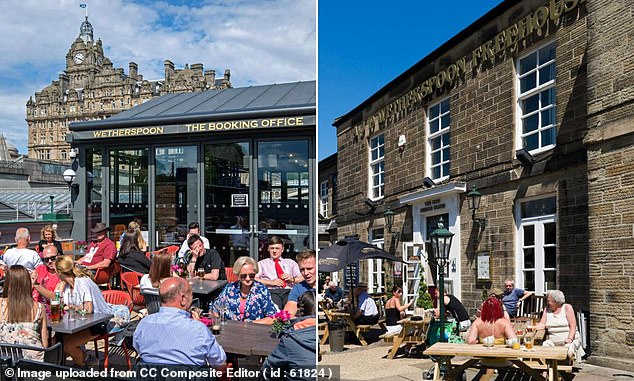Britain’s pubs should be focusing on how to deliver fun-filled Christmas celebrations.
Instead, these companies which have large numbers of staff are calculating the possibly existential cost of the Budget’s tax rises.
Pubs face a multi-million-pound blow from employers’ national insurance increases and the higher minimum wage. These changes have caused a sharp descent in the share prices of Wetherspoons, Marston’s and Mitchell & Butlers, which are some of the sector’s big listed names.
But is this a justified reaction, indicating that pubs can no longer be a warm and welcoming space for investors? Or do the share price falls present a chance to back the pub companies that can exploit the new more challenging environment, although profit margins are already thin and consumers potentially resistant to yet more price rises.
After all, the more innovative players in the licensed premises game may be able to seize market share from competitors who buckle in the face of the additional tax burden.

Welcoming: The Wyre Bridge House pub garden in Buxton (above right) and The Booking Office Wetherspoons in Edinburgh
Reeves may have cut the duty on beer, but just by 1p. But Shore Capital say that the national insurance rises are the equivalent of a 5p rise in the price of a pint – at a time when pubs have been losing customers to the lure of the cheap liquor offer of supermarkets.
For the owner of a sole pub who cannot benefit from economies of scale, the extra taxes are estimated to be the equivalent of 40-50p on the price of a pint. This suggests that more such pubs will be shuttered.
This week, Michael Turner, chairman of Fuller, Smith & Turner, which has about 380 pubs in the south of England, called Chancellor Rachel Reeves’s measures a ‘direct attack on those labour-intensive industries that are the lifeblood of our economy’, adding that pub companies would be ‘driven to the wall’.
Turner also highlighted the role that pubs play in their communities – which, so he argues, is greater than their contribution to the Exchequer.
About 80 pubs a month have closed their doors for the last time every month this year, with the rate of closure accelerating.
In the 1970s, there were about 75,000 pubs in Britain. There may now be about 46,000.
One of the loudest voices in the outcry has been the (rarely reticent on any issue) chairman of Wetherspoons Sir Tim Martin, whose annual tax bill has grown by £60m.
Last month the £762m company reported a bounce in sales, a reduction in its debt as part of an overall strengthening of the balance sheet and said it plans to have 1,000 pubs: currently it has about 800.
But despite this encouraging news, such has been the impact of the Budget changes that Wetherspoons’ share price is now down by nearly a quarter for the year to date to 626p.
This is 60 per cent below its level of five years ago, highlighting the size of Wetherspoons’ payroll costs – it employs about 43,000 staff – but also the attrition that the sector has already suffered from the pandemic and the cost of living crisis. Another woe is the spread of teetotalism among younger generations.
Wetherspoons was famously named for a teacher who believed that Martin would be a failure. Instead, he has devised a new formula for the pub that is popular among value-conscious customers, including many students.
Wetherspoons, or ‘Spoons’, as it is known to the faithful, offers a wide menu of dishes, including breakfast at some outlets, Lavazza coffee (at £1-£2, with free re-fills), real ale and rooms.
The pub group’s most popular draught offering is cola, on which the margins are fatter than beers.
Pubs do not make much money on beer – profits come from food, soft drinks and wines – although Martin hails the success of Guinness. This is now a fashionable tipple among women and men looking for a lower-calorie indulgence. As Russ Mould of AJ Bell puts it ‘Wetherspoons has done a brilliant job of reinvention’, reflecting a view that the company should be able to sustain this process. No analysts rate the shares a ‘sell’.
Last week analysts at equity research firm Alpha Value upgraded the shares to a ‘buy’ with a target price of 810p. Goodbody has set a target of 900p.
Mould considers that Fuller, Smith & Turner, a £246m business should be able cope well, given the location of its pubs in the more affluent areas of London, Hampshire and Warwickshire, while grabbing more market share.
The Fuller’s chairman may be rightly alarmed for the sector, but the chief executive Simon Emeny says that, despite the Budget ‘we remain positive and optimistic about the future’.
Fuller’s shares are up by 6.3 per cent this year to 704p.

In charge: Wetherspoons boss Sir Tim Martin
Analysts rate the shares a ‘hold’, but are confident about the prospects, setting an average target price of 866p.
Many invest in Fuller’s for its potential, but also for its shareholder perks: if you own 1,000 shares you qualify for a 15 per cent discount at the pubs and hotels.
Mitchells & Butlers, the £1.4billion pub and restaurant group, owns such brands as All Bar One, Browns Restaurants, Harvester, Toby Carvery, Harvester and Son of Steak and has about 50,000 individuals on its payroll.
Its shares have dipped this year by nearly 9 per cent to 231.5p, this is 44 per cent lower over five years. However, seven of the ten analysts that follow the stock rate it a ‘buy’, with an average target price of 348p. This assessment suggests that the company, which said in September that it continued to win a bigger slice of the market, will step up this process.
A fortnight before the Budget, Wolverhampton-based Marston’s unveiled a plan to be a ‘high-margin, highly-cash generative local pub company’.
This followed the sale of 40 per cent stake in a joint venture with Carlsberg which was sold back to the Danish brewing giant.
The deal trimmed Marston’s debt.
But subsequently shares in the £231m company have dropped by 14 per cent amid the Budget-fall-out this past month.
Again, analysts are confident, setting an average target price of 60p. This represents a big bet on the implementation of the ambitious new strategy.
A degree of optimism also surrounds the outlook for Young & Co’s Brewery which now runs about 280 pubs in London and the South of England, having acquired City Pub Group a year ago. The purchase may have added to the £356m company’s borrowings but, for the moment, analysts believe that the boost from the transaction can start to trim these debts.
Young’s shares have declined by 14 per cent this year to 960p. But analysts think the stock is a ‘buy’ and have set a target price of 1374p.
Putting money into pub shares at this uncertain moment is a considerable gamble. You must trust that people’s desire to go out and have a good time outweighs discontent over the inevitable price rises.
The risks are large. However, there have been pubs in Britain for about 2,000 years. They were introduced during the Roman occupation. If you want your investing to have a social purpose, supporting the companies that are successfully reimagining these places for the 21st Century, may be its own reward.
DIY INVESTING PLATFORMS

AJ Bell

AJ Bell
Easy investing and ready-made portfolios

Hargreaves Lansdown

Hargreaves Lansdown
Free fund dealing and investment ideas

interactive investor

interactive investor
Flat-fee investing from £4.99 per month

Saxo

Saxo
Get £200 back in trading fees
Trading 212
Trading 212
Free dealing and no account fee
Affiliate links: If you take out a product This is Money may earn a commission. These deals are chosen by our editorial team, as we think they are worth highlighting. This does not affect our editorial independence.
Some links in this article may be affiliate links. If you click on them we may earn a small commission. That helps us fund This Is Money, and keep it free to use. We do not write articles to promote products. We do not allow any commercial relationship to affect our editorial independence.
This article was originally published by a www.dailymail.co.uk . Read the Original article here. .

